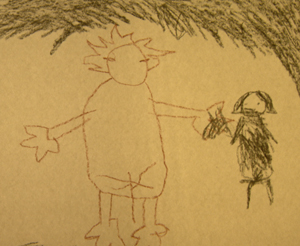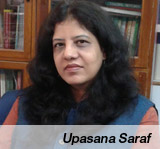
The law protecting children against sexual abuse, called Protection of Children against Sexual Offences Act, 2012 (POCSO), has been welcomed by many. Here, organizations that are working for children give us feedback on this new law and its effect.
> “The POCSO Act is unique as it requires all actors within the legal system to modify their professional practice while dealing with child victims of sexual offences. Police officials, doctors, judges, lawyers and prosecutors must be trained to understand children’s vocabulary and developmental maturity in order to pose age-appropriate questions to them; to assess the value of their statements; and to help them in their journey towards justice.
Most states have not yet notified special courts or appointed special public prosecutors. Cases of offences against children are therefore still being brought before regular criminal courts, thus denying children their right to a child-friendly system and structure.
Moreover, the act has raised the age of consent from 16 to 18 years without considering scientific evidence on adolescent sexuality. Children involved in sexual activity will be treated as juveniles in conflict with the law. In cases of consensual sexual relationships between those in the age group of 16 and 18 years, how can we distinguish between the victim and the perpetrator?
The effectiveness of a law depends largely on the people responsible for its implementation and application. State governments will have to ensure that all the requirements specified under the law are in place and all key stakeholders will have to internalize the core principles of child rights in order for the law to work.”
Anuroopa Giliyal, Geeta Sajjanashetty and Swagata Raha, lawyers, Centre for Child and the Law
The Centre for Child and the Law is located at the National Law School of India University, Bangalore. It uses the law and psycho-socio-legal strategies as tools for transformative social change and to enable children to live with dignity.
> “A landmark legislation, POCSO is the first step towards protecting children in India from crimes of a sexual nature. Many hope this will fill a long-felt void in the legal and institutional response on the issue. However, unless rigorously enforced, the legislation by itself can achieve little.
Extensively disseminating knowledge about POCSO can make a difference among law enforcement agencies, child protection institutions, judiciary and society. Accountability should be periodically reviewed to ensure the law serves its purpose.”
Bhuwan Ribhu, Activist, Bachpan Bachao Andolan
Bachpan Bachao Andolan is an organization that has been working on behalf of children for the last 33 years. Till date, it has rescued over 82,000 children from trafficking, abuse and child labour, and has helped them rebuild their lives.
> “Post Satyamev Jayate, we have had an interesting experience especially on the awareness building front. A lot more schools and parent bodies accept the existence of the issue now instead of being a part of the conspiracy of silence which had been surrounding child sexual abuse in India so far.”
We were conducting awareness sessions in a school in Kashmir Valley and for cultural and sociological reasons, we were slightly apprehensive about the extent of openness with which to approach the topic of CSA with the parents and teachers. But truly to my pleasurable surprise, all parents and teachers were extremely comfortable discussing this issue and seemed to be fairly aware of its prevalence and dynamics. On further questioning, we were told that they had seen the episode of Satyamev Jayate!”
Suchismita Bose, Director, The Foundation
The Foundation runs ‘Help Eradicate Abuse through Learning’ (HEAL), a programme that works against Child Sexual Abuse. It conducts free workshops for adults and children, and provides psychosocial guidance to survivors of CSA.
> “POCSO is an excellent piece of legislation. It is very comprehensive and addresses various gaps and lacunae which were prevailing earlier. There are certain drawbacks in the law around issues of consent and mandatory reporting, but hopefully, these will be addressed when the law is open for amendment.”
Vidya Reddy, Founder-Director, Tulir - Centre for the Prevention and Healing of Child Sexual Abuse
Tulir is an organization committed to working against child sexual abuse, and is involved in both direct intervention and advocacy at various levels across India and other parts of South Asia.
> “We haven’t seen any increased reporting of cases after POCSO was passed. The sense we have got is that people are extremely wary of reporting cases, or even coming to service delivery agencies like ours because it is mandatory to report these crimes. Doctors refuse to examine children and school managements are unwilling to implement personal safety programmes. Even NGOs hesitate to bring cases to us. Hence, preventive work is getting affected.”
Pooja Taparia, Founder and Chief Executive, Arpan
One of Arpan's key projects is teaching children personal safety skills in schools so that they can protect themselves from sexual abuse. Over the last seven years, the organization has reached out to over 2,00,000 children and adults through direct services, training, and the capacity building of various stakeholders.
> “There is certainly more awareness among parents, educators and the police. It is easier to talk to them now and one doesn’t have to encounter the ‘much ado about nothing’ attitude. Many NGOs and activists have been working simultaneously, and the media has helped highlight cases. The impact can be seen through the collective effort of all these forces.”
Upasana Saraf, Clinical Psychologist and Head, Human Resources Department, Bombay Cambridge Gurukul School
Since 2009, the five Bombay Cambridge Gurukul schools have been running a personal safety programme to educate students, parents and teachers about child sexual abuse.

CASE STUDY
Before the Criminal Law Amendment Act, 2013 and POCSO, there were two punishable sexual offences in the IPC—rape, that is, peno-vaginal penetration, and outraging the modesty of a woman, which referred to actions such as groping or taking indecent photographs. The law did not distinguish between adult and child survivors. In POCSO, all types of sexual offences against children as well as their corresponding punishments have been listed in detail.
BEFORE POCSO
In State vs Pankaj Chaudhary (2011), the accused had inserted his fingers inside the vagina and anus of a five-year-old girl. He was accused of 'outraging the modesty of a woman’ as there was no concept of penetration with fingers in Indian law. The defence had won in this case.
AFTER POCSO
In State vs Manoj Shah and Pradeep Kumar (2013), two men could face life imprisonment under POCSO for sexually assaulting a five-year-old girl. This case began in April 2013.
Source: Bhuwan Ribhu, Bachpan Bachao Andolan